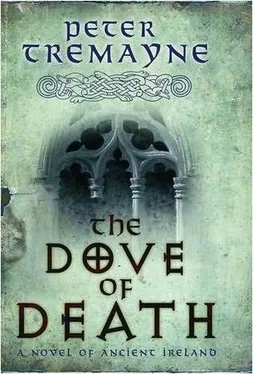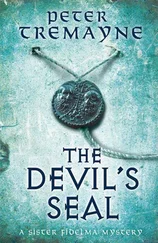Peter Tremayne - The Dove of Death
Здесь есть возможность читать онлайн «Peter Tremayne - The Dove of Death» весь текст электронной книги совершенно бесплатно (целиком полную версию без сокращений). В некоторых случаях можно слушать аудио, скачать через торрент в формате fb2 и присутствует краткое содержание. Жанр: Исторический детектив, на английском языке. Описание произведения, (предисловие) а так же отзывы посетителей доступны на портале библиотеки ЛибКат.
- Название:The Dove of Death
- Автор:
- Жанр:
- Год:неизвестен
- ISBN:нет данных
- Рейтинг книги:5 / 5. Голосов: 1
-
Избранное:Добавить в избранное
- Отзывы:
-
Ваша оценка:
- 100
- 1
- 2
- 3
- 4
- 5
The Dove of Death: краткое содержание, описание и аннотация
Предлагаем к чтению аннотацию, описание, краткое содержание или предисловие (зависит от того, что написал сам автор книги «The Dove of Death»). Если вы не нашли необходимую информацию о книге — напишите в комментариях, мы постараемся отыскать её.
The Dove of Death — читать онлайн бесплатно полную книгу (весь текст) целиком
Ниже представлен текст книги, разбитый по страницам. Система сохранения места последней прочитанной страницы, позволяет с удобством читать онлайн бесплатно книгу «The Dove of Death», без необходимости каждый раз заново искать на чём Вы остановились. Поставьте закладку, и сможете в любой момент перейти на страницу, на которой закончили чтение.
Интервал:
Закладка:
Although forewarned, when Brother Metellus came to collect them from the house of Lowenen and his wife, Onenn, neither Fidelma nor Eadulf were expecting the festivities that greeted them. They were led down a path between the stone cabins and onto a sandy strand where a large fire had been lit. In fact, there were several smaller fires along the shore. Beyond them the dark seas, now and then with a thin line of white showing where the waves were breaking, whispered and chattered over the rocks before sliding silently shoreward. Many people were crowded round the fires. Brother Metellus had told them that there were only about a hundred or so islanders, and it seemed every one of them was there.
‘Remember that the lives of these people are harsh,’ he explained, ‘so they seize any opportunity to celebrate and make merry.’
A few men were playing instruments, providing a musical background for a young man who was singing and amusing some of the younger folk who clapped their hands to the rhythm. The instruments were similar to those that Fidelma had seen in her own land, although one man was playing a set of pipes which had a higher pitch than those native to Muman.
There was a smell of cooking permeating the area, and many pots were steaming on the small fires while on others, various types of fish were being roasted on sticks. Brother Metellus led them to a table, erected on the sandy shore, on which plates with various vegetables and salads were set out, beside jugs of what they quickly discovered was cider. They were seated next to Lowenen and his wife Onenn.
The feasting, the songs, the drinking and the merrymaking went on into the night. Eadulf could see that, although she did her best to disguise her feelings, Fidelma was still reeling from the shock of the death of her cousin and from the events that had occurred on the Barnacle Goose . He attempted to help her by taking much of the conversation on himself. Having studied herbs as part of a medical training, he was interested in some of the salad that was presented to him; it contained some silver-green leaves that gave it a very strong flavour. Brother Metellus told him that they were from a plant that grew all over the land, in dry sandy soil; its spiky leaves did not vanish with the seasons but kept evergreen. Only at the height of summer did it produce yellow flowers, from which the islanders often made an infusion to cleanse their stomachs. Not knowing the plant and never having seen it in his own land, nor in Éireann for that matter, Eadulf could not speculate on its properties.
After an interminable round of toasting and the consumption of much cider, for wine from the mainland was scarce, it was Brother Metellus who eventually rose and suggested that they ought to retire as they would have a taxing sea journey to the mainland at dawn.
To Eadulf, it seemed that Fidelma looked relieved and rose with alacrity. They walked slowly back to Lowenen’s house where Brother Metellus left them, saying he would come for them just after first light. They retired to the tiny chamber they had been given by Onenn and her husband Lowenen. The noise of the music and the people still at the feasting came faintly to their ears as they prepared for bed. Fidelma sat on the side of the mattress, holding the white hazel wand of office that she had managed to save in their escape; her Cousin Bressal’s wand of office as an envoy. She turned it over in her hands in moody contemplation and then placed it by the side of the bed.
‘I think that symbol of the dove meant something to Brother Metellus,’ she said to Eadulf without preamble.
When he expressed surprise, Fidelma described the expression that she had seen for a fleeting moment on the Roman’s face.
‘Are you sure?’ asked Eadulf, not convinced.
‘You realise that I cannot go back to Cashel until I have tracked down the murderer of my cousin and brought him to justice,’ she said, not responding to his question. ‘Nor can I abandon Murchad’s crew on the Barnacle Goose — young Wenbrit and the others who have been taken as prisoners or worse.’
Eadulf regarded her solemnly. He had suspected the thoughts that had been passing through her mind.
‘Do you not think it more important to get home — home to Alchú, our son, and to your brother, who has more power to pursue this matter? He could send a delegation, warriors, to the King of the Bretons and they would be better placed to track down these murderers.’
Fidelma shook her head firmly. Her features were controlled.
‘I do not make this decision lightly. Of course it is important for us to return home to our son. We have been away too long. But you do not realise the shame that would be upon me if I went back without making any effort to find out who has done this terrible thing. The satirists would bring blotches to my face and, more importantly, to the face of my brother, the King. He could even be forced to abdicate. The line of our dynasty, the Eóghanacht, could be stigmatised for ever.’
Had Eadulf not spent years among the people of the Five Kingdoms, he would have considered the statement overly dramatic. However, he knew that it was a preoccupation among his wife’s people that their honour, what they called enech or ‘face’, should in no way be besmirched. If they were dishonoured, it was believed that a poet could write a satire that would raise blotches on their face for everyone to see, revealing their dishonour. A satire could even cause people to die of their shame. Eadulf was sure that Fidelma did not believe in the supernatural powers of the poets but, before the coming of the New Faith, it was widely accepted and even now, while some referred to it with half-hearted humour, many people fully believed. Indeed, even the laws of which Fidelma was an advocate, dictated that the composing of a wrongful satire was worthy of fine and punishment. Likewise it was illegal to satirise a person after their death. But if the satire was truthful…a king or a noble had to tolerate satire or lose their honour price if they brought the poet to the court and the court found the poet’s words to be truthful.
Wisely, Eadulf did not rebuke her on the matter of dishonour.
‘So what do you intend?’ he asked.
Fidelma gestured with a slight rise and fall of her shoulder. ‘Someone around these shores must know about that ship that attacked us. When the time is right, I shall ask Brother Metellus what that dove means to him. Someone will know which direction the ships sailed, or where the Barnacle Goose was being led.’
‘The sea is a big place.’
‘We have searched bigger,’ replied Fidelma. ‘And we have been successful in our searches.’
Eadulf suppressed a sigh. He realised that no matter what obstacles he pointed out, Fidelma would have none of them. She had made up her mind on a course of action and she was going to take it — in spite of all the obvious difficulties.
‘I presume your plan will be to make enquiries at the abbey of this Gildas when we reach the mainland tomorrow?’
Fidelma could hear the disapproval in his voice.
‘That would be a logical assumption!’ she retorted, turning her back on him as she lay down in the bed.
Eadulf said nothing for a moment or two. Then he shrugged and blew out the candle.
For some time he lay on his back, hands behind his head, listening to the distant sounds of the music and the voices from the beach where the feasting was continuing. Then sleep caught him unawares.
It was still dark when he opened his eyes again. No; not quite dark. There was a greying light, that curious pre-dawn twilight, filtering through the window and causing dark shadows in the room. He wondered what had awakened him at this hour. Fidelma lay beside him, still asleep. He could hear her breathing deeply and regularly. It was surely time to rise and get ready to leave with Brother Metellus…Then he suddenly noticed: the wind had changed. Last night, its sound had been soft, almost sibilant, but it was moaning now around the corners of the house, tearing at the sloping roof. Overnight, the soft summer breezes had changed into fierce gusting winds.
Читать дальшеИнтервал:
Закладка:
Похожие книги на «The Dove of Death»
Представляем Вашему вниманию похожие книги на «The Dove of Death» списком для выбора. Мы отобрали схожую по названию и смыслу литературу в надежде предоставить читателям больше вариантов отыскать новые, интересные, ещё непрочитанные произведения.
Обсуждение, отзывы о книге «The Dove of Death» и просто собственные мнения читателей. Оставьте ваши комментарии, напишите, что Вы думаете о произведении, его смысле или главных героях. Укажите что конкретно понравилось, а что нет, и почему Вы так считаете.











